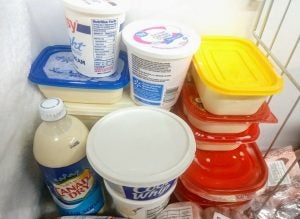We are almost done with lambing!
The breed of sheep we raise cycle in the fall, so we turn rams out with the ewes around mid September, which means lambs are born around Valentine’s Day and we finish up around now. Only a couple ewes left to go!
We had a pretty good year overall despite the extreme #polarvortex temperatures at times. We lost a few lambs, unfortunately, but it’s all part of it. When we’re all finished, we should have almost 300 ewes and lambs running around.
Yes, sometimes things go wrong — whether it’s temperature related, the occasional freak accident, or an older ewe that can’t quite produce enough milk to feed her lambs, where we have to step in and be the “parents” to them. This means we have an “orphan” pen, where we have a separate room in the barn so we can keep an extra-close watch and feed them milk replacer and monitor their health. It’s the most adorable room on the farm.
These orphan lambs are a few weeks old, and you can tell in the video they’re in transition to solid feed, so they’ve got that, but also a lot of milk replacer!
To all the mamas out there … if you’ve ever had trouble breastfeeding your baby where you couldn’t produce enough milk, you know how emotionally exhausting and frustrating it can be.
On the flip side, maybe you produce too much. Maybe you’re able to freeze some of yours and donate it to another mom in need.
Fun fact: The same thing happens with livestock!
In preparation for lambing, in February we got some colostrum from our neighbors’ dairy farm.
In case you’re not aware, colostrum is the very important nutrients needed for mammals within their first 24 hours after birth. Thankfully dairy cows produce more than enough — they can nurse calves with it and also help our lambs! So, we put all this colostrum in containers and freeze it, and defrost some as needed to help bottle feed a struggling newborn lamb if the mama ewe is having issues. It’s a pretty small percentage of ewes that have trouble, but it’ll definitely happen. Lambing is a demanding 24/7 job, but it’s also very rewarding. Their lives literally depend on us.

Some people (usually in animal rights’ group circles) may think it’s a little weird to drink milk from another species, but in reality it can — and does — happen all the time! Colostrum or milk is a healthy and nutritious drink for all different kinds of mammals. So cheers to all the mamas out there for nurturing their babies and to the cows, sheep, goats, etc. that provide the delicious and healthy milk and cheese we enjoy!
For more information on lambing, read an article I wrote about it here.
Michelle Miller, the Farm Babe, is an Iowa-based farmer, public speaker, and writer, who lives and works with her boyfriend on their farm, which consists of row crops, beef cattle, and sheep. She believes education is key in bridging the gap between farmers and consumers.



